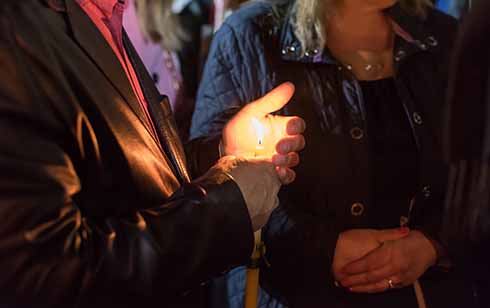 ‘I’ve always believed in grace’ I stated at the end of the funeral of the mother of a friend. ‘Grace who?’ my friend asked in reply.
‘I’ve always believed in grace’ I stated at the end of the funeral of the mother of a friend. ‘Grace who?’ my friend asked in reply.
My friend, let’s call her Sharon, had lived with a deep, sad depression for most of her life. Her mother had been her ‘rock’. Sharon had always had thoughts of suicide in her life, and I thought the death of her mother would completely take away any resilience she had left in her. Sharon somehow managed to cope with the death of her mother remarkably well. Not just cope, but she was able to reach out to others who were grieving. I saw grace in action in Sharon. In times of grief, sadness, trauma, devastation, people have questioned ‘Why do bad things happen to good people?’ The belief I have is that things happen, and God gives the grace to cope with these things.
The above experience helps me to understand prayer in a deeper way. Now I understand redemptive suffering. Rather than dividing us, suffering unites us. Sacrifice unites us and prayer unites us.
A relationship
‘Prayer is not a button to be pushed, but a relationship to be pursued.’ (Carey Nieuwhof, Twitter, March 23, 2021). Carey goes on to say that Christians should stop saying ‘prayer works’, when things turn out the way they wanted, or if they got what they wanted.
The root of the word pray in Latin comes from precari: to ask, entreat, to beg. However, if we take the Hebrew form tefillah, it’s like sharing whatever is in your heart with your God.
There is the act of saying prayers, which could be a form of prayer. There are numerous types of psalms we could pray: psalms of lament, thanksgiving, pilgrimage, royalty and wisdom. The whole of the scriptures is available to us.
Thanks to Vatican II there has been a revival of the contemplative dimension of Christianity. There is a gradual return to a more ancient method in the monastic form of Lectio Divina – divine reading – through the moments of reading, reflecting, responding and resting.
My dear nonna, who lived until she was nearly 107, taught me everything about prayer. She had lived in Melbourne for the last half of her life, but was not able to hold a conversation in English. Actually, my nonna hadn’t been to Mass for the last six years of her life and received communion weekly from the extraordinary ministers to the sick. She had her trinity of prayers – Our Father, Hail Mary and the Nicene Creed. Until a few weeks before she died, she could still pray the Nicene Creed, word for word. I can only do that when I am surrounded by a church full of people. Her prayers had kept her faith strong. Prayer is not about the words we use, but our presence before God.
Real presence
Robert Marsh in an article in ‘The Way’ would suggest to spiritual directors to encourage their directees to ‘pray as if God is real’, expecting that God would be a real presence in our prayer experiences. Which reminds me of Thomas Merton’s description of contemplative prayer as prayer that is ‘centred entirely on the presence of God’.
Our call in prayer is to share what is in our heart with God – whether it’s praising, blessing, complaining or requesting.
I have been using a method of prayer called centring prayer. Centring prayer is a method of silent prayer that prepares us to receive the gift of contemplative prayer. Prayer in which we experience God’s presence within us – 20 minutes of silence and focus, twice a day.
In the early days of giving workshops on centring prayer, a nun told one of the founders, Fr Thomas Keating, that she was failing at the prayer. ‘In 20 minutes” she said, ‘I’ve had ten thousand thoughts!’
‘How lovely,’ responded Keating, ‘ten thousand opportunities to return to God’.
Prayer is a relationship to be pursued.